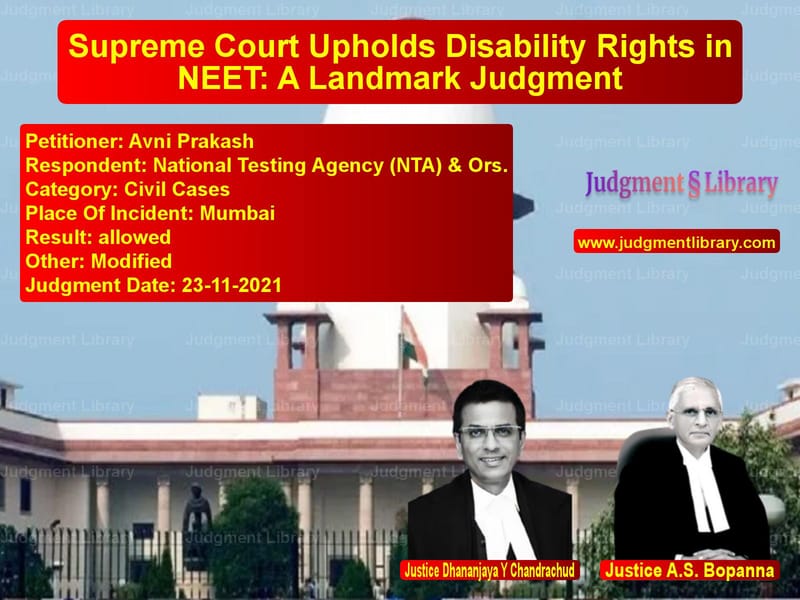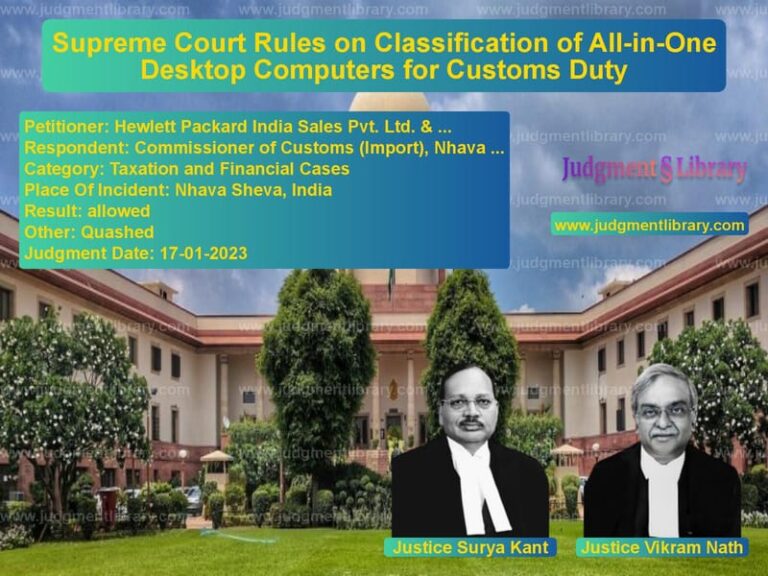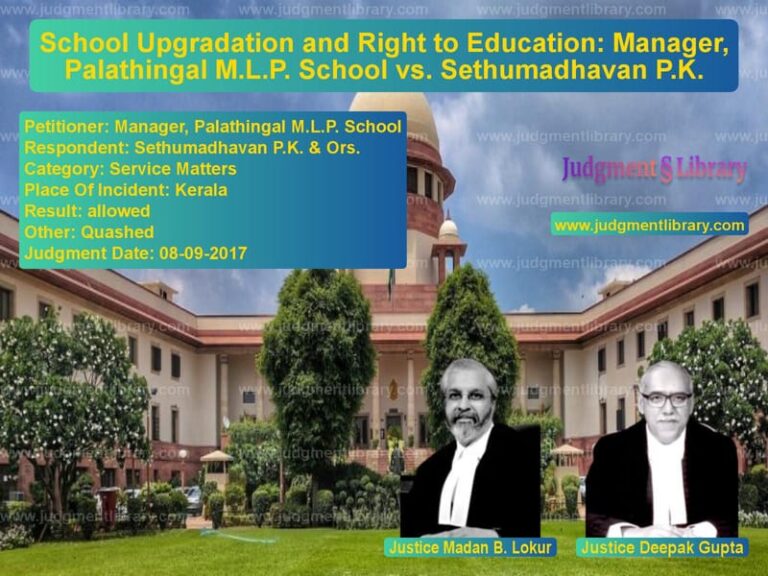Supreme Court Upholds Disability Rights in NEET: A Landmark Judgment
The Supreme Court of India, in its judgment dated 23 November 2021, ruled in favor of Avni Prakash, a candidate with dysgraphia who was denied her legally mandated compensatory time while appearing for the National Eligibility cum Entrance Test (NEET). The Court directed the National Testing Agency (NTA) to take necessary corrective measures and ensure that students with disabilities are granted their rightful accommodations during competitive exams.
Background of the Case
Avni Prakash, the appellant, is a person with benchmark disability (PwBD) as per the Rights of Persons with Disabilities (RPwD) Act, 2016. She suffers from Dysgraphia, a condition affecting writing abilities, and had a 40% permanent disability certification. She was entitled to an extra hour of compensatory time in the NEET exam, as mandated by the NEET Bulletin 2021 and the Guidelines for Written Examinations issued by the Ministry of Social Justice and Empowerment.
However, when she appeared for the NEET exam on 12 September 2021 at her allotted center, Thakur College of Engineering and Technology, Mumbai, she was denied the extra hour by the examination authorities. Her answer sheet was forcibly collected along with regular candidates, depriving her of a reasonable accommodation under the law.
Petitioner’s Arguments
The petitioner, represented by her legal counsel, argued:
- She had a certified disability and was entitled to compensatory time under the law.
- The NEET examination center was unaware of the rules and denied her rightful accommodation.
- The denial of extra time violated her rights under the RPwD Act, 2016.
- The NTA failed to train its examination staff, leading to this injustice.
Respondent’s Arguments
The respondents, including NTA, countered by arguing:
- The petitioner had not obtained the required disability certificate in the prescribed format (Appendix VIII-A of the NEET Bulletin).
- Allowing re-examination for one candidate would set an impractical precedent.
- The admission process was already underway, and altering ranks would impact other candidates.
- NTA had planned to issue better guidelines for handling such cases in future exams.
Supreme Court’s Observations
The Supreme Court, comprising Justices Dhananjaya Y Chandrachud and A.S. Bopanna, analyzed the NEET Bulletin 2021, the RPwD Act, and past judicial precedents. The Court observed:
- The petitioner was entitled to compensatory time under Para 5.4(b) of the NEET Bulletin 2021.
- The requirement for an Appendix VIII-A certificate applied at the admission stage, not during the examination.
- The denial of extra time was a clear violation of the Guidelines for Written Examinations and the RPwD Act.
- The confusion among NTA officials and examination centers demonstrated a lack of proper training.
Key Supreme Court Rulings Cited
The Court referred to important precedents, including:
- Vikash Kumar v. UPSC (2021) – Affirming that reasonable accommodations must be provided to PwD candidates.
- Vidhi Himmat Katariya v. State of Gujarat (2019) – Clarifying that disability certification requirements apply at the admission stage.
- National Testing Agency v. Vaishnavi Vijay Bhopale (2021) – Rejecting re-examination requests but allowing rectification of procedural errors.
Supreme Court’s Directives
The Supreme Court issued the following directives:
- Compensatory Action: NTA must take steps to rectify the injustice caused to the petitioner, such as awarding compensatory marks or using an alternative method to account for the lost time.
- Clearer Guidelines: NTA must clarify the distinction between disability-related provisions for the exam and for admissions in future NEET bulletins.
- Training for Examination Centers: NTA must ensure that invigilators and exam staff are properly trained to implement accommodations for disabled candidates.
- Periodic Review: NTA must regularly review its policies to prevent similar injustices in future competitive exams.
Implications of the Judgment
This ruling has far-reaching consequences for disability rights and competitive exams in India. Key takeaways include:
- Enforcement of Disability Rights: Exam authorities must comply with the RPwD Act and ensure reasonable accommodations.
- Responsibility of Testing Agencies: Bodies like NTA must proactively prevent violations and rectify errors when they occur.
- Judicial Protection for PwD Candidates: The courts will intervene to ensure fair treatment of disabled students in exams and admissions.
The Supreme Court’s judgment in this case reinforces the legal and constitutional rights of students with disabilities, ensuring they receive the accommodations they are entitled to under the law.
Petitioner Name: Avni Prakash.Respondent Name: National Testing Agency (NTA) & Ors..Judgment By: Justice Dhananjaya Y Chandrachud, Justice A.S. Bopanna.Place Of Incident: Mumbai.Judgment Date: 23-11-2021.
Don’t miss out on the full details! Download the complete judgment in PDF format below and gain valuable insights instantly!
Download Judgment: avni-prakash-vs-national-testing-age-supreme-court-of-india-judgment-dated-23-11-2021.pdf
Directly Download Judgment: Directly download this Judgment
See all petitions in Education Related Cases
See all petitions in Judgment by Dhananjaya Y Chandrachud
See all petitions in Judgment by A. S. Bopanna
See all petitions in allowed
See all petitions in Modified
See all petitions in supreme court of India judgments November 2021
See all petitions in 2021 judgments
See all posts in Civil Cases Category
See all allowed petitions in Civil Cases Category
See all Dismissed petitions in Civil Cases Category
See all partially allowed petitions in Civil Cases Category







